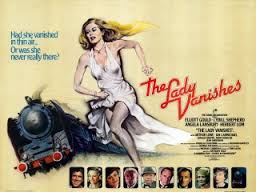
THE LADY VANISHES
UK, 1979, 97 minutes, Colour.
Elliott Gould, Cybill Shepherd, Angela Lansbury, Herbert Lom, Arthur Lowe, Ian Carmichael, Gerald Harper, Jean Anderson, Jenny Runacre.
Directed by Anthony Page.
Whereas Alfred Hitchcock had only obviously contrived sets for his '30s classic version of this humorous train spy adventure, Anthony Page has beautiful Panavision Austrian settings, used to great advantage. The very British screenplay (with its cricket fans, Arthur Lowe and Ian Carmichael this time) has been internationalised by comic writer George Axelrod (though keeping close to the original plot). Leads are now American Elliott Gould as reluctant hero and Cybill Shepherd, imitating Carole Lombard, as a madcap heiress with pluck. Angela Lansbury is the benign nanny of the title. The film highlights the Nazi atmosphere of 1939 and, as remakes and updatings go, this film is very enjoyable.
1. An enjoyable comedy adventure - its quality as a remake, the reputation of the original, the adaptation and updating? A new audience, a new style? The '30s and Nazism seen in retrospect?
2. The popularity of train films - trains in themselves, train lines, movement, stops, the time taken on a train journey, the landscapes through which the passengers pass? How well was the train journey used here? The importance of the colour photography, Austrian settings and beauty? Musical score?
3. The popularity of Hitchcock's '30s original? Its very British style, use of studio sets? This more opulent remake? The internationalising of the film? The opening with 1939 and the Nazis, the governess and Bavaria,, British holidaymakers? The violence inherent in Nazi Germany? The contrast with stiff upper lip and cricket-loving British and madcap Americans?
4. The tongue-in-cheek style. the mock heroics? The blend of the serious and the comic? The presentation of action adventure and yet the satiric touch? The kind of response wanted from the audience?
5. The appeal of the basic story: train adventures, the gallery of characters, espionage, suspense? The presentation of Germany in 1939? The atmosphere of war? Holiday-makers in Germany?
6. The contrasts of the opening - the Nazis, the tourists? The change in atmosphere, the authority of the Nazis, the rounding up of the tourists, the last train? The atmosphere of violence? The pre-war atmosphere and the uncertainties of what was to follow? Audience response with the hindsight of the war and its issues?
7. The presentation of the Americans and the British - the type of holidaymakers at the party? Amanda and her weddings, her impersonation of Hitler? Robert Condon and his disdain? The madcap style of the party? The contrast with the two British cricket fans? Miss Froy and her work as a governess? The international flavour of the opening?
8. The building of suspense with the getting to the train, Amanda and her dress, her frantic hurry? The establishment of the mood?
9. The introduction to Amanda as the American madcap heiress of '30s films? The comic touches of her getting to the train and her imitation of Hitler? The fact of her being in evening dress throughout the film? Her finally getting on the train, establishment of contact with Condon? The friendship with Miss Froy. the group of Germans in the train? The buffet car, the cup of tea with the special tea? Her sleeping, her not being believed about Miss Froy's disappearance, the search, her response to the various denials? Condon and his help, his beginning to believe her? The sharing of dangers, her almost being thrown from the train etc.? Working together with Condon'. suspicion of Dr. Hartz? The quick thinking, the pretence of being poisoned? The rediscovery of Miss Froy, learning the tune? The battle? The happy ending? A heroine of '30s films?
10. The contrast with Robert Condon and his sardonic newspaper reporter, observer? Gradual involvement? His fear of danger, the mock heroics? Elliott Gould's style of comic hero?
11. Miss Froy and her work as a nanny, her importance for the war effort? Walking round the town, her talking, tea on the train? writing her name on the window (and its disappearance)? Her disappearance, her being rescued, teaching the melody, stalking off into the mountains, her fulfilling her mission at the end?
12. The various types on the train - the baroness and her company, their lies, violence? Frau Kummer and her being bandaged and taking Miss Froy's place? Dr. Hartz and his pleasant manner, his help, the gradual revelation of his sinister work, the nurse, the nun? His wife and her betrayal?
13. The Todhunters and their bickering, perception, their denial of knowledge of Miss Froy? The clash, the final battle and Todhunter's death? His selfishness?
14. The very English gentleman, the satire on the British types and their love of cricket? Their participation in the battle? The end and the Test being washed out?
15. The personnel on the train, the use of the train and its gradual momentum, passing through Germany, the action on the move? The quality of the adventures - and their perennial appeal? The enjoyment value of romance and adventure? A satisfying remake?